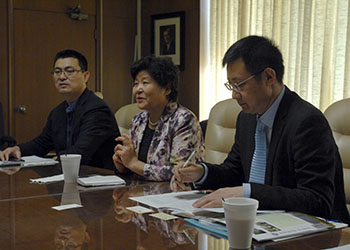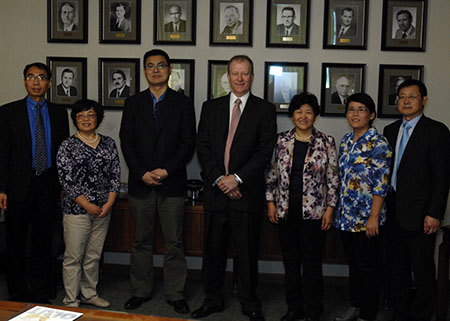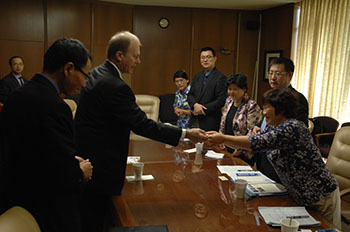Delegation explores expansion of exchange programs
 Lamar University hosted a visit from a delegation of administrators, staff and faculty of Qilu University of Technology (QLUT) Nov. 5.
Lamar University hosted a visit from a delegation of administrators, staff and faculty of Qilu University of Technology (QLUT) Nov. 5.
The group visited with LU faculty, toured the campus, and met with administrators as in a visit aimed toward a better understanding of LU’s academic programs and expansion of the current exchange student program between QLUT and Lamar University.
Presently four QLUT students are enrolled at LU in chemical engineering as exchange students at the master’s level.
Representing Qilu University of Technology were: Guangzhi Wang, vice president of the university council; Jianguo Guo, associate professor and director of the Talents Affairs Leading Group Office; Xiuzhi Shao, professor and deputy director of the Division of Light Industry; Mei Li, associate professor and vice dean of the School of Material Science and Engineering; and Zeqing Fang, associate professor and vice director of the International Office. Michael Jiang, director of International Student Services and Recruitment for LU, organized the delegation’s visit to the campus.
 The delegation met with James Marquart, provost and vice president for academic affairs, where they discussed exploring expansion of the current student exchange program, and the possibility of creating a 2+2 program, where students complete the first two years of their bachelor’s program at Qilu then transfer to LU to complete their degree
The delegation met with James Marquart, provost and vice president for academic affairs, where they discussed exploring expansion of the current student exchange program, and the possibility of creating a 2+2 program, where students complete the first two years of their bachelor’s program at Qilu then transfer to LU to complete their degree
“We are very pleased with the excellent students we have here now from Qilu University of Technology,” Marquart said. “We look forward to continued opportunity to mutually benefit for a strengthening relationship between our universities.”
Qilu University of Technology is located in Jinan, a historical and cultural city known as the “City of Spring” in northeast China. Adjacent to the Yellow River and Mount Tai in Shandong province, QLUT is in Jinan, a city of more than 7 million residents.
 The main campus, covering more than 2,000 acres, was founded in 1948. With more than 30,000 full-time students, QLUT offers degrees covering engineering, science, management, humanities and social science, with 71 undergraduate majors and 64 master’s level subject areas.
The main campus, covering more than 2,000 acres, was founded in 1948. With more than 30,000 full-time students, QLUT offers degrees covering engineering, science, management, humanities and social science, with 71 undergraduate majors and 64 master’s level subject areas.
International cooperation through faculty and student exchange programs as well as joint programs such as 3+1 and 2+2 programs are not new to QLUT. The university has active programs with 30 universities in numerous countries, including the United Kingdom, United States, Canada, South Korea, Germany, Australia, Finland, Poland, Russia, Denmark, Iceland, Japan, India and Malaysia.


